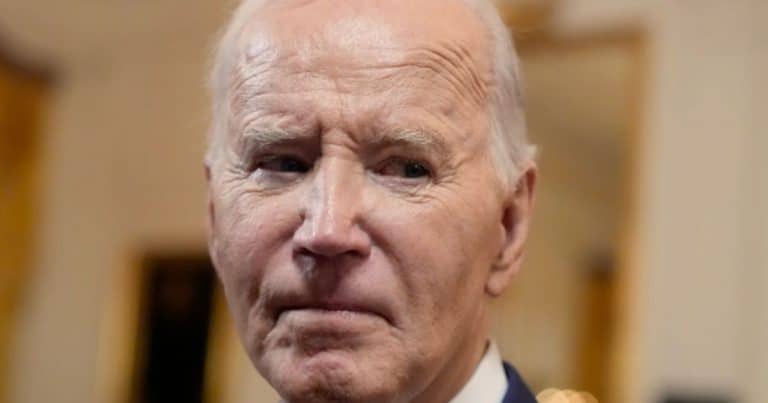The Biden administration’s regulatory onslaught continues in its final months, with yet another sweeping federal mandate threatening to upend entire American industries and communities. This latest move, rushed through in Joe Biden’s final days in office, exemplifies a concerning pattern of executive overreach that has become all too familiar.
Economic experts warn the impending regulation could eliminate more than 150,000 American jobs. It could also strip billions in tax revenue from state and local governments already struggling with budget shortfalls. The impact would be particularly devastating for rural communities and family farms across multiple states.
It’s only now, as the administration quietly pushes this regulation through final review, that the full scope of its destructive potential is becoming clear. If this sounds like typical Washington bureaucrats making decisions without considering real-world consequences, just wait.
Biden’s Latest Ban
The regulation in question? A Food and Drug Administration rule that would effectively ban virtually all cigarettes currently sold in the United States by mandating drastically reduced nicotine levels. While presented under the guise of public health, critics say the move represents a devastating blow to American workers, farmers, and law enforcement capabilities.
“This is a ridiculous push,” warns Richard Marianos, former assistant director of the Bureau of Alcohol, Tobacco, Firearms and Explosives. “This is a gift that Biden is giving to criminals out there, and they’re going to capitalize on it, and there’s not a thing we’re going to be able to do except react instead of be proactive.”
Indeed, the economic toll would be staggering. According to analysis from Chmura Economics & Analytics, the mandate would result in annual losses of $24 billion in federal, state, and local tax revenue. Beyond the immediate 150,000 job losses, experts predict devastating ripple effects throughout local economies, particularly in agricultural communities.
“What people need to understand is we don’t have people that are just tobacco farmers. They are tobacco farmers and also produce and vegetable farmers, or wheat farmers, or they also have hogs and cattle because we’re a diversified agriculture state,” explains Ray Starling, general counsel for the North Carolina Chamber of Commerce. “If you take tobacco farming out of the quiver of some of these farmers, it will be what sort of tips them over to the edge.”
Suspicious Timing Of New Regulation
The regulation’s timing is particularly suspect, coming in the final months of Biden’s term after a similar attempt to ban menthol cigarettes failed in December 2023 amid widespread opposition. The administration appears determined to push through its agenda regardless of economic consequences or public sentiment.
Remember when we were told prohibition would work? How did that turn out?
Perhaps most alarming are the warnings from law enforcement experts about how criminal enterprises would exploit the situation. Marianos, now a Georgetown University professor, predicts the ban would create a massive black market opportunity for international cartels and organized crime syndicates.
“You’re going to empower the cartels on the border, you’re going to empower the Chinese counterfeiters. You’re going to empower Russian organized crime to sell these cigarettes because it’s not going to stop the demand,” Marianos explains. “Prohibition, or any type of change in a product like this, never works. It never will work.”
Law enforcement agencies, already stretched thin dealing with the border crisis and rising crime rates, would face an impossible task trying to combat widespread tobacco trafficking. The proposed regulation provides no additional resources to address this challenge.
Here’s where Americans are fighting back.
Americans Fight Back
State leaders are already preparing legal challenges.
“We’re all fighting in the courts now anyway. We’d be foolish to take that off the table,” Starling stated. He suggested that a coalition of affected states would likely sue to block implementation.
The mandate would also jeopardize billions in payments that states receive annually under the Tobacco Master Settlement Agreement. These losses could potentially exceed $21 billion per year. This would force states to either cut essential services or raise taxes to cover the shortfall.
Beyond the immediate economic impact, the regulation represents yet another example of federal bureaucrats imposing sweeping changes without congressional approval or meaningful public input. The administration’s willingness to sacrifice American jobs and empower criminal enterprises in service of its regulatory agenda should concern all citizens who value limited government and economic freedom.
As states prepare their legal challenges and affected communities brace for impact, this latest regulatory overreach serves as a stark reminder of the importance of restraining executive power and protecting American workers from bureaucratic mandates that threaten their livelihoods and communities.
Key Takeaways:
- Biden’s last-minute nicotine regulation threatens 150,000 American jobs and $24B in tax revenue.
- Law enforcement experts warn cartels and foreign criminals will exploit black market opportunities.
- State leaders preparing legal challenges to protect local economies and traditional farming communities.
- This is the latest example of federal overreach bypassing Congress to impose devastating regulations.
Sources: Fox News, The Washington Examiner


Leave a Comment